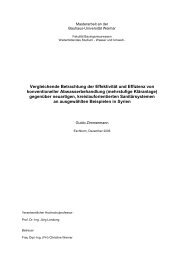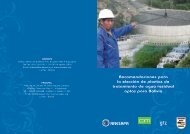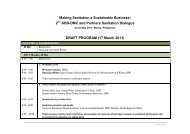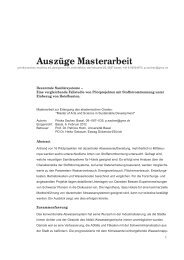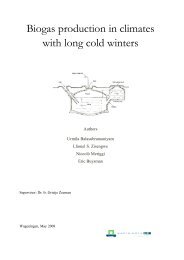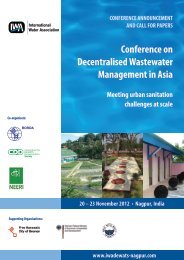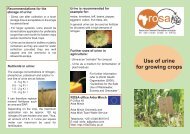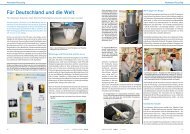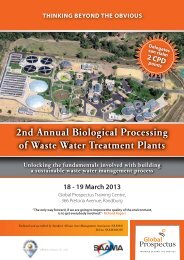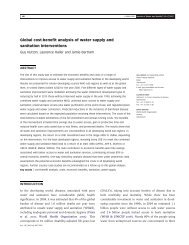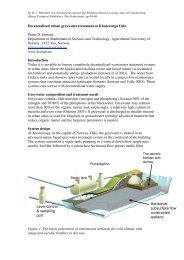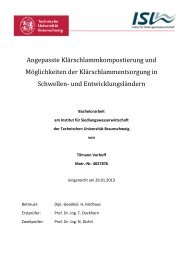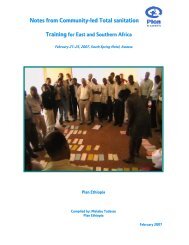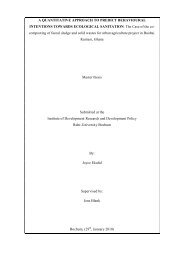Economic Effects of Sustainable Sanitation - SuSanA
Economic Effects of Sustainable Sanitation - SuSanA
Economic Effects of Sustainable Sanitation - SuSanA
You also want an ePaper? Increase the reach of your titles
YUMPU automatically turns print PDFs into web optimized ePapers that Google loves.
Case Study Kampala<br />
decentralised onsite sanitation (cf. chapter 6.1.1.1). If resources allow expenses for toilets,<br />
they are constructed by the landlords or residents themselves; KCC is <strong>of</strong>fering advice,<br />
subsidised emptying service (six, plus 13 recently purchased trucks) and is responsible for law<br />
enforcement. Advice and emptying is also provided by the PEA with 35 trucks. The PEA<br />
considers itself as having the biggest share in the market.<br />
During the interviews a lack <strong>of</strong> presence <strong>of</strong> community health <strong>of</strong>ficers or ―people from KCC‖<br />
for advisory services was reported and the law enforcement is commented to be deficient.<br />
6.1.3.2 Logistics <strong>of</strong> human excreta<br />
Besides the interview with a PEA representative, two additional interviews have been<br />
conducted. One took place with staff from a Water Suppliers Association 50 (WSA) in order to<br />
sample all available options for the transport <strong>of</strong> liquids. In addition, in order to also sample<br />
the transport options for the solid fraction, interviews with truck owners and operators <strong>of</strong> the<br />
‗Transporters Association Railway‘ 51 were carried out.<br />
The person interviewed from the PEA would be willing to transport urine from UDDTs.<br />
However, it was found that the PEA trucks are contaminated and therefore not suited for the<br />
transportation <strong>of</strong> urine 52 . The interviewees from the WSA consider the business <strong>of</strong> urine<br />
transportation as impossible since the trucks would get contaminated and it would ruin their<br />
reputation. Since the faeces from UDDTs are ideally dry, transportation in suction trucks<br />
would not be possible. The interviewees from the ‗Transporters Association Railway‘<br />
indicated a willingness to transport faeces in closed boxes or other containers that can be<br />
sealed.<br />
In general the interviewees indicated not being interested in household collection in slum<br />
areas. A need for collection points with good road accessibility was expressed. Except the<br />
WSA, the stakeholders interviewed, indicated to be very interested to open up new business<br />
opportunities. In all interviews <strong>of</strong>fers regarding the transportation costs <strong>of</strong> the individual<br />
service providers have been surveyed in order to consider the potential <strong>of</strong> contracting them for<br />
the logistics system. However, preliminary calculations rated the costs as too high 53 as the<br />
owners or operators were probably including the pr<strong>of</strong>it margins commonly applied for<br />
individual trips. The interviewee from the PEA even recommended opening up a new separate<br />
business in order to maximise the efficiency and be able to <strong>of</strong>fer a suited service.<br />
50<br />
A „Water Suppliers Association― is a pool <strong>of</strong> private tank truck owners sharing <strong>of</strong>ficial water pipes for filling<br />
up the trucks. The water is delivered to any destination for a fee. Within the city <strong>of</strong> Kampala there are three<br />
<strong>of</strong>ficial water pipes for filling up tank trucks.<br />
51<br />
This transporters association is a typical cluster <strong>of</strong> trucks with different capacities that can be rented out for<br />
any kind <strong>of</strong> transportation job. Those clusters can be found throughout the city.<br />
52<br />
The storage time for sanitatisation <strong>of</strong> urine as recommended by WHO is at least one month. Crosscontamination<br />
with faeces requires a storage <strong>of</strong> 1.5 to two years (WHO, 2006, p. XVI-XVII)<br />
53<br />
Prices varied according to the distance. The best price for e.g. a 10 000 l tank truck trip outside <strong>of</strong> Kampala to<br />
the nearest agricultural area (25 km) was 36 to 53 EUR. The price for a truck trip with 2 t capacity doing the<br />
same distance was 36 EUR.<br />
50



